Youth unemployment has become a persistent problem in Ireland in recent years, with a significantly higher rate of joblessness among those aged 15 to 24 years old compared to the overall unemployment rate in the country.
The latest data from the Central Statistics Office (CSO) shows that the youth unemployment rate in Ireland stood at 18.1% in December 2022, compared to the overall unemployment rate of 5.3% for the same period.
The number of people in Ireland “not in employment, education or training” (NEET) in 2022 for those aged 15-29 was 8.9%.
On Thursday 11 May, the Economic and Social Research Institute (ESRI) held a conference on employment opportunities for young people. This event brought together academics, policymakers and youth workers to explore the opportunities and challenges associated with youth employment. ESRI researchers presented studies focusing on young people in the NEET category, specifically those aged 15-29. This research is part of a collaborative European project Cowork4YOUTH.
Rural youth unemployment
But what are the issues faced by young people in rural Ireland?
Youth Work Ireland Tipperary is a volunteer-led organisation that is running a youth employment initiative to support 18- to 24-year-olds in the NEET category. This project’s current funding is from the Department of Social Protection and family support project fund.

Moira Merrigan, Youth Work Tipperary.
Moira Merrigan is the leader of the Tipperary initiative and helps 15 young people at a time through the programme. There are four key phases used during the programme to help vulnerable NEETs, including creating an individual development plan to set out a pathway to progress into a long-term training programme, employment scheme or job.
Moira sees one of the biggest barriers right now as an increase in homelessness due to the lack of affordable accommodation locally.
“People would be surprised by the levels of homelessness in that age group. It’s hidden homelessness, the majority of them are staying with family and friends. Their accommodation isn’t secure,” she says.
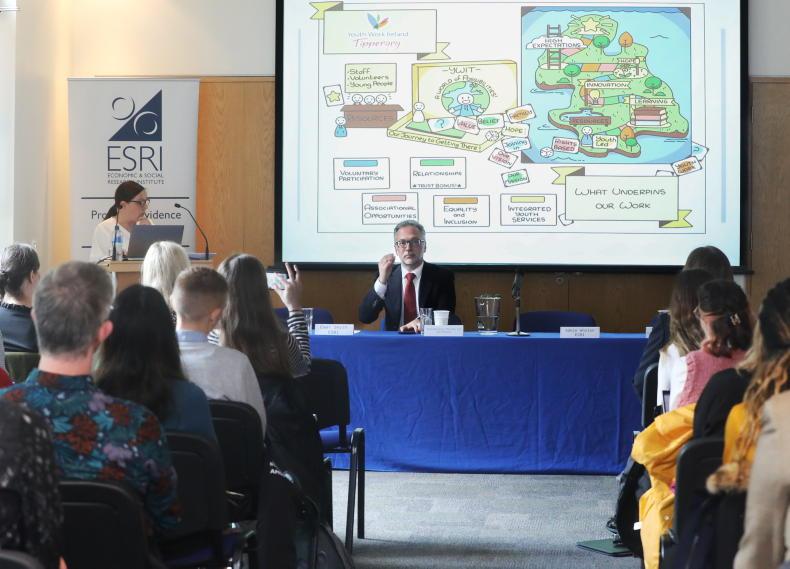
The ESRI hosted an open event for a collaborative European project titled Cowork4YOUTH. This project focuses on young people not in employment, education or training (NEETs), specifically those aged 15-29. \ Leah Farrell / RollingNews.ie
“There is a lot of talk about rent caps in the city, it is very much focused on student accommodation or houses to buy. I think the issue around how it has affected small towns hasn’t been talked about. There is a lack of rental accommodation,” she continues.

Andrea Fitzpatrick taking part in the Youth Employment Initative in Tipperary on a field trip to Doon Social Farm.
“You are looking at €900 for a small flat in Tipp town, which has increased massively in the last couple of years in the rent crisis.
“If they are lucky enough to get into accommodation, most of the rental properties will have pre-paid power [which tend to have] high rates of electricity and it’s very hard to keep the bills paid.”
Transport
Another major issue is the accessibility to transport. Due to price increases with driving lessons and insurance, there are barriers in the way for anyone trying to get on the road.
“There is one-third of the population in Tipperary who don’t own their own car, the families themselves don’t own their own car. When you are starting from zero and trying to get on the road, that’s really hard,” says Moira.
She also sees young people being pushed out of trades due to transport restrictions.
“We are really lucky that there is a new construction training centre in the town; they have really accessible courses. That has been a massive asset to Tipperary and my cohort. They can literally walk down the road to it. But again, they are coming out of it now depending on if they get set up with someone who can provide transport. You have to be able to drive to get to their job,” she says.
Regarding public transport, Moira has seen an improvement in the local links and routes they are taking. But some practical elements are still lacking. With the strong position of Ireland’s labour market, she believes now is the time to join the dots.
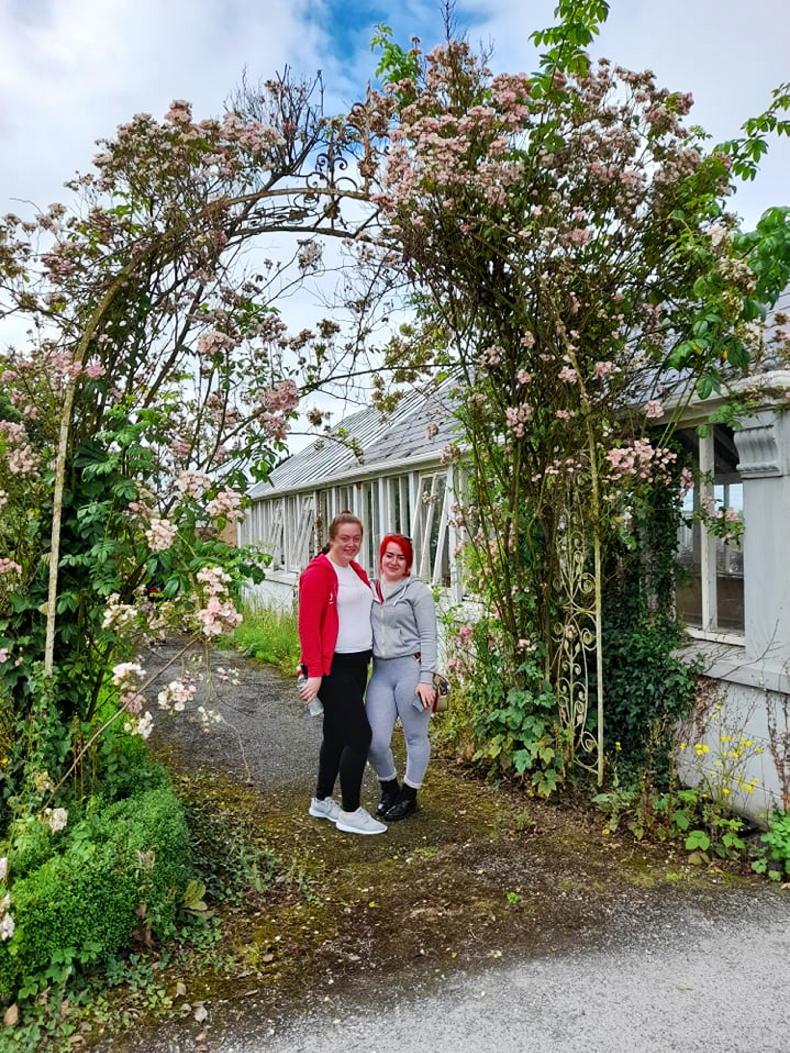
Margaret Collins, Leeanne Fitzpatrick taking part in the Youth Employment Initiative Tipperary on a trip to Doon Social Farm.
“If we can utilise this time now to really get it right in how we work with those who are the most vulnerable and the furthest removed from the labour market, now is the time to do that while the opportunities are there,” she says.
For more information on Youth Work Tipperary, visit https://youthworktipperary.ie/
Debbie Bough, EU projects co-ordinator with Meath Partnerships is also working on the ground on this issue.
Meath is experiencing one of the highest rates of youth unemployment in Ireland.
Established in 2006, Meath Partnership delivers a range of rural, social and economic programmes at local level, including the EU’s “Stay On” project that aims to enable young people to “stay on” rural land by providing adequate skills for the rural labour market, such as digital skills, abilities to manage environmental impacts, and personal development.
Debbie outlines what she feels are the main issues behind youth unemployment in rural Ireland.
“We find that there is a lack of opportunities in rural areas for young people in the areas that they are skilled and trained in. A lack of suitable employment options is pushing many of our clients towards the cities or abroad, often to Australia or Canada,” she explains.
Another problem they are seeing in the Meath area is that the younger cohort with additional needs are finding it challenging to travel independently to Dublin for work opportunities.
“This results in young people becoming isolated and often unemployed as they cannot travel long distances on an unreliable public service network,” says Debbie.
She says that young people with autism in particular receive little support.
“If they wish to attend educational institutions, many of the smaller providers in rural areas do not have the capacity, resources, or knowledge to support their additional needs. As a result, we see people getting caught between the gaps in the system,” says Debbie.
One of Meath Partnership’s biggest challenges when trying to integrate rural youth into education and training opportunities is the lack of access to regular transport options across the county.
“We often see that many training providers, on paper, are advertising training opportunities in smaller towns,” says Debbie.
“However, due to spaces on the courses not being filled in time, many of these courses are cancelled and don’t go ahead. While there are resources, funding, and tutors available, we cannot seem to locate the young people to take part in the training that we are offering.”
For more information, visit
https://youthworktipperary.ie/ and https://www.stay-on.eu/
Risk factors
Massimiliano Mascherini is a senior research manager coordinating projects on youth unemployment, NEETs and their social inclusion at Eurofund.
Speaking at the conference, he highlighted the risks factors for
ending up in NEETs as:
Lower educational level.Suffering some kind of disability.Immigration background.Difficult family environment.Living in remote areas.Low household income.What works in
supporting
young people
Martin Quigley, is the director of data and analytics at Pobal, which works on behalf of Government with communities to support social inclusion and community development.
The Social Inclusion and Community Activation Programme (SICAP) 2018-2023 provides funding to tackle poverty and social exclusion through local engagement and partnerships between disadvantaged individuals, community organisations and public sector agencies.
Martin set out what had been found to work in supporting young people through the SICAP programme:
Coaching is effective when
working with young people with lower motivation.Time and skills are required to support young people to manage life challenges.Mental health is an issue for young people and is often left unspoken.Creating an environment that encourages peer support helps.Training should be reflective of the workplace.Programming need to be informed by the cultural needs of minority groups.Enterprise programmes require thoughtful design and careful participant selectionPobal provides management and support services to 41 programmes, schemes and services in the areas of social inclusion and equality, inclusive employment and enterprise, and early years and young people.
Read more
Young innovators impress at Student Enterprise Final
We all get imposter syndrome - here’s how to deal with it
Youth unemployment has become a persistent problem in Ireland in recent years, with a significantly higher rate of joblessness among those aged 15 to 24 years old compared to the overall unemployment rate in the country.
The latest data from the Central Statistics Office (CSO) shows that the youth unemployment rate in Ireland stood at 18.1% in December 2022, compared to the overall unemployment rate of 5.3% for the same period.
The number of people in Ireland “not in employment, education or training” (NEET) in 2022 for those aged 15-29 was 8.9%.
On Thursday 11 May, the Economic and Social Research Institute (ESRI) held a conference on employment opportunities for young people. This event brought together academics, policymakers and youth workers to explore the opportunities and challenges associated with youth employment. ESRI researchers presented studies focusing on young people in the NEET category, specifically those aged 15-29. This research is part of a collaborative European project Cowork4YOUTH.
Rural youth unemployment
But what are the issues faced by young people in rural Ireland?
Youth Work Ireland Tipperary is a volunteer-led organisation that is running a youth employment initiative to support 18- to 24-year-olds in the NEET category. This project’s current funding is from the Department of Social Protection and family support project fund.

Moira Merrigan, Youth Work Tipperary.
Moira Merrigan is the leader of the Tipperary initiative and helps 15 young people at a time through the programme. There are four key phases used during the programme to help vulnerable NEETs, including creating an individual development plan to set out a pathway to progress into a long-term training programme, employment scheme or job.
Moira sees one of the biggest barriers right now as an increase in homelessness due to the lack of affordable accommodation locally.
“People would be surprised by the levels of homelessness in that age group. It’s hidden homelessness, the majority of them are staying with family and friends. Their accommodation isn’t secure,” she says.

The ESRI hosted an open event for a collaborative European project titled Cowork4YOUTH. This project focuses on young people not in employment, education or training (NEETs), specifically those aged 15-29. \ Leah Farrell / RollingNews.ie
“There is a lot of talk about rent caps in the city, it is very much focused on student accommodation or houses to buy. I think the issue around how it has affected small towns hasn’t been talked about. There is a lack of rental accommodation,” she continues.

Andrea Fitzpatrick taking part in the Youth Employment Initative in Tipperary on a field trip to Doon Social Farm.
“You are looking at €900 for a small flat in Tipp town, which has increased massively in the last couple of years in the rent crisis.
“If they are lucky enough to get into accommodation, most of the rental properties will have pre-paid power [which tend to have] high rates of electricity and it’s very hard to keep the bills paid.”
Transport
Another major issue is the accessibility to transport. Due to price increases with driving lessons and insurance, there are barriers in the way for anyone trying to get on the road.
“There is one-third of the population in Tipperary who don’t own their own car, the families themselves don’t own their own car. When you are starting from zero and trying to get on the road, that’s really hard,” says Moira.
She also sees young people being pushed out of trades due to transport restrictions.
“We are really lucky that there is a new construction training centre in the town; they have really accessible courses. That has been a massive asset to Tipperary and my cohort. They can literally walk down the road to it. But again, they are coming out of it now depending on if they get set up with someone who can provide transport. You have to be able to drive to get to their job,” she says.
Regarding public transport, Moira has seen an improvement in the local links and routes they are taking. But some practical elements are still lacking. With the strong position of Ireland’s labour market, she believes now is the time to join the dots.

Margaret Collins, Leeanne Fitzpatrick taking part in the Youth Employment Initiative Tipperary on a trip to Doon Social Farm.
“If we can utilise this time now to really get it right in how we work with those who are the most vulnerable and the furthest removed from the labour market, now is the time to do that while the opportunities are there,” she says.
For more information on Youth Work Tipperary, visit https://youthworktipperary.ie/
Debbie Bough, EU projects co-ordinator with Meath Partnerships is also working on the ground on this issue.
Meath is experiencing one of the highest rates of youth unemployment in Ireland.
Established in 2006, Meath Partnership delivers a range of rural, social and economic programmes at local level, including the EU’s “Stay On” project that aims to enable young people to “stay on” rural land by providing adequate skills for the rural labour market, such as digital skills, abilities to manage environmental impacts, and personal development.
Debbie outlines what she feels are the main issues behind youth unemployment in rural Ireland.
“We find that there is a lack of opportunities in rural areas for young people in the areas that they are skilled and trained in. A lack of suitable employment options is pushing many of our clients towards the cities or abroad, often to Australia or Canada,” she explains.
Another problem they are seeing in the Meath area is that the younger cohort with additional needs are finding it challenging to travel independently to Dublin for work opportunities.
“This results in young people becoming isolated and often unemployed as they cannot travel long distances on an unreliable public service network,” says Debbie.
She says that young people with autism in particular receive little support.
“If they wish to attend educational institutions, many of the smaller providers in rural areas do not have the capacity, resources, or knowledge to support their additional needs. As a result, we see people getting caught between the gaps in the system,” says Debbie.
One of Meath Partnership’s biggest challenges when trying to integrate rural youth into education and training opportunities is the lack of access to regular transport options across the county.
“We often see that many training providers, on paper, are advertising training opportunities in smaller towns,” says Debbie.
“However, due to spaces on the courses not being filled in time, many of these courses are cancelled and don’t go ahead. While there are resources, funding, and tutors available, we cannot seem to locate the young people to take part in the training that we are offering.”
For more information, visit
https://youthworktipperary.ie/ and https://www.stay-on.eu/
Risk factors
Massimiliano Mascherini is a senior research manager coordinating projects on youth unemployment, NEETs and their social inclusion at Eurofund.
Speaking at the conference, he highlighted the risks factors for
ending up in NEETs as:
Lower educational level.Suffering some kind of disability.Immigration background.Difficult family environment.Living in remote areas.Low household income.What works in
supporting
young people
Martin Quigley, is the director of data and analytics at Pobal, which works on behalf of Government with communities to support social inclusion and community development.
The Social Inclusion and Community Activation Programme (SICAP) 2018-2023 provides funding to tackle poverty and social exclusion through local engagement and partnerships between disadvantaged individuals, community organisations and public sector agencies.
Martin set out what had been found to work in supporting young people through the SICAP programme:
Coaching is effective when
working with young people with lower motivation.Time and skills are required to support young people to manage life challenges.Mental health is an issue for young people and is often left unspoken.Creating an environment that encourages peer support helps.Training should be reflective of the workplace.Programming need to be informed by the cultural needs of minority groups.Enterprise programmes require thoughtful design and careful participant selectionPobal provides management and support services to 41 programmes, schemes and services in the areas of social inclusion and equality, inclusive employment and enterprise, and early years and young people.
Read more
Young innovators impress at Student Enterprise Final
We all get imposter syndrome - here’s how to deal with it








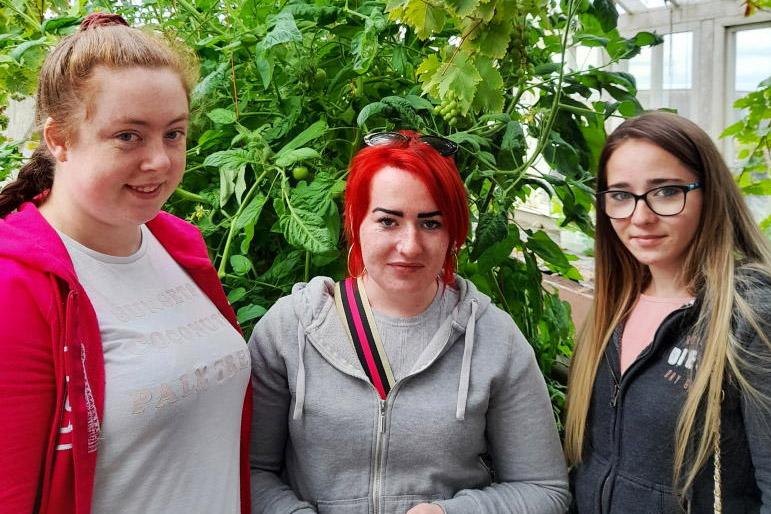
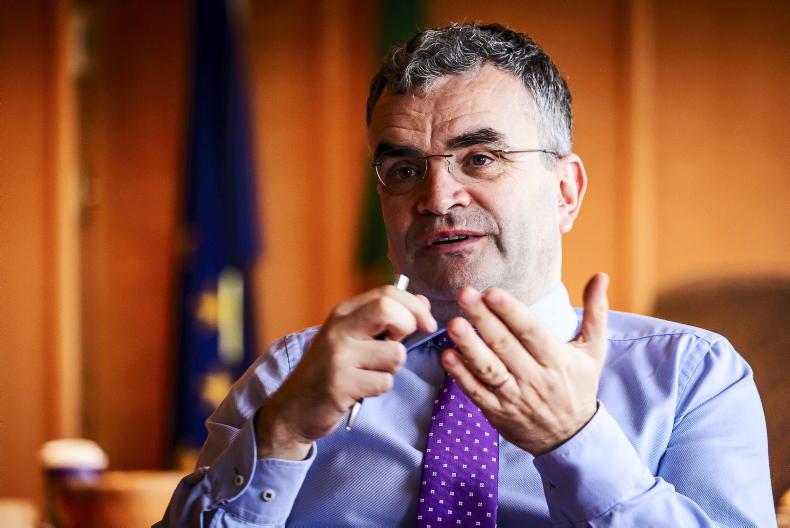
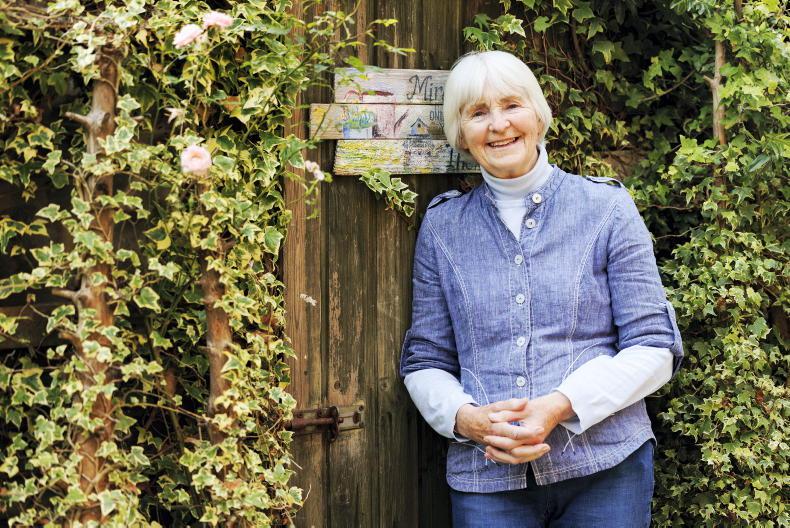


SHARING OPTIONS